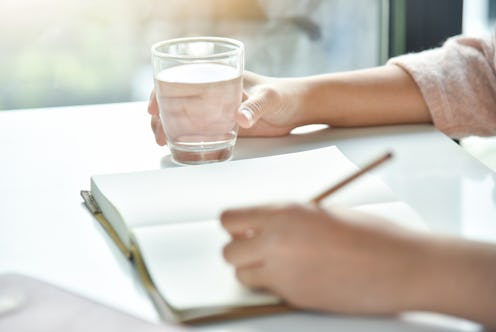Life
A Study Says Recycled Toilet Water Tastes Better Than Tap — Here’s Why That’s A BFD
I'm a self-proclaimed water snob. If I'm drinking tap water, I'm squeezing half a lemon into my glass to disguise the flavor. It sounds ridiculous to most people, but I've been staunch in my water preferences — which is why I'm intrigued about new research that examines toilet-to-tap water. What is toilet-to-tap water? According to the BBC, water that gets flushed or poured down a drain is recyclable, and it can be filtered and treated until it's safe to drink. I have a visceral reaction at the thought of drinking water that was once in a toilet, but a study from the University of California, Riverside, found that recycled wastewater tastes better than tap water. The study is published in journal Appetite.
Researchers already knew that recycled wastewater is safe for drinking — all that's left is getting people like me who are grossed out on board with the concept. They conducted a blind taste test and gave 143 people samples of tap water, bottled water and recycled wastewater (researchers call it indirect potable reuse, or IDR). Participants ranked the water on taste, texture, smell, color and temperature and found that tap water ranked lower, while bottled water and recycled wastewater were equally liked. "The groundwater-based water was not as well liked as IDR or bottled water," study co-author and UC Riverside professor Mary Gauvain said in a press release about the findings. "We think that happened because IDR and bottled water go through remarkably similar treatment processes, so they have low levels of the types of tastes people tend to dislike."
The researchers also asked people about their levels of neuroticism and their openness to new experiences. People who considered themselves neurotic preferred both bottled water and IDR water, while adventurous people rated the samples the same. Even though the thought of drinking water that was once in someone's toilet may make you shudder, the implications of this study are huge. The water is just as safe as anything else you drink, and it may even taste better thanks to its rigorous filtering process. In states like California, getting people to use recycled wastewater would be a huge win for the drought-affected environment. The BBC says that a city that recycles all of its wastewater can reduce its water needs by 60 percent.
Not every study participant was a fan of recycled wastewater, though. Women were twice as likely to prefer bottled water when compared to men. The researchers theorize that women have more extreme reactions to tastes they don't like, which could explain why the women surveyed rated bottled water highly. Still, the study's results are promising — although the challenge of getting people on board with recycled wastewater remains. "It seems that this term (wastewater), and the idea of recycled water in general, evokes disgust reactions," lead author Daniel Harmon said in the press release. "It is important to make recycled water less scary to people who are concerned about it, as it is an important source of water now and in the future."
Taste and safety aren't standing in the way of recycled wastewater dominating the market — our wariness about toilet-to-tap is what stops us from changing our water consumption habits. But it's hard to ignore the environmental benefits that could result. According to the study, six water agencies in California are already using recycled wastewater, and researchers hope that more will follow. No one wants to think about toilets when they're drinking a glass of water, but once you get over the ick factor, you have an environmentally conscious option that tastes pretty good.
